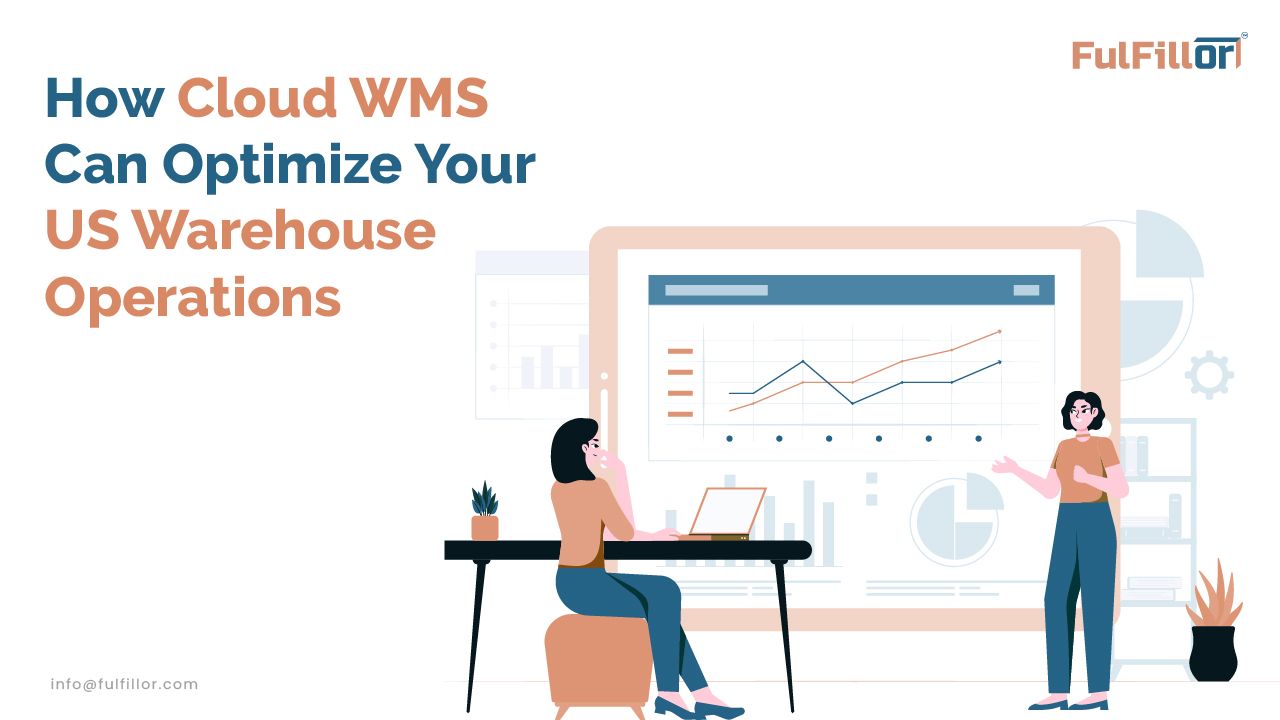How Cloud WMS Can Optimize Your US Warehouse Operations
In the ever-evolving technology-led landscape having efficient warehouse management is a must. It not only helps you gain a competitive edge but also helps in the seamless management of the warehouse processes alongside enhanced customer satisfaction and quicker order fulfillment rate. However, with the increasing operational costs, it is also important to take care of the profitability and returns alongside different aspects of a warehouse process.
This is where the cloud WMS software emerges as a powerful tool.
Having a cloud-based warehouse management system helps navigate the complex landscape of warehouse activities with efficiency and ease. In this blog, we will explore how a cloud WMS helps optimize warehouse operations.
So, let's dive in!
What is Cloud WMS (Warehouse Management System) ?
A Cloud Warehouse Management System is a software system that is hosted on remote servers and facilitates the management of warehouse operations. It eliminates the need for significant upfront investments in hardware and IT infrastructure while enabling businesses to manage their warehouses more effectively with ease from anywhere, and at any time.
Benefits of Using Cloud Warehouse Management System for Warehouses
Having a cloud WMS software for warehouses caters to innumerable benefits. Some of them are as follows -

- Cost Efficient
- Data-Driven Insights
- Enhanced Accuracy and Reduced Errors
- Improved Productivity
- Real-time Inventory Management
- Scalable and Flexible
Cost Efficient - The primary benefit of using cloud-based WMS for your warehouses is that it is cost-efficient. This implies that moving to a cloud-based warehouse management system, significantly reduces the costs, as it provides subscription-based pricing, compared to on-premise software with large upfront capital investments.
In addition, it reduces errors alongside eliminating the risks of overstocking and understocking which also leads to increased cost savings along with lower carrying costs.
Data-Driven Insights - It also offers valuable insights into your warehouse operations with advanced analytics and reporting capabilities, thus helping you track key performance indicators (KPIs), identify market trends, and discover growth opportunities for your business. It also helps optimize the warehouse operations which helps minimize losses alongside forecast future demands.
Enhanced Accuracy and Reduced Errors - Using cloud-based WMS software also helps reduce errors and improve accuracy by automating repetitive tasks and processes. This in turn significantly reduces operational costs and eliminates manual labor, thus providing better customer satisfaction. It also leads to the effective utilization of warehouse space.
Improved Productivity - A Cloud-based warehouse management system also helps increase the productivity of the employees with automation which helps streamline warehouse processes like picking, packing, shipping, storage, and more. It also helps track the real-time performance of employees alongside optimized task allocation thus helping reduce manual efforts and focus on strategic activities.
Real-time Inventory Management - Another important benefit of using a cloud-based WMS is that it helps provide real-time visibility into the stock levels which ensures accurate inventory management, reduces the risk of overstocking and understocking, and further helps reduce the risks associated with it, eliminates the losses, alongside facilitates improved order fulfillment rates.
In addition, it also provides real-time data, which helps in making enhanced business decisions alongside enhanced operational efficiency.
Scalable and Flexible - Another benefit of using a cloud-based WMS for your warehouses is that it is scalable, which implies that it can easily scale up or down accordingly to accommodate your business needs and demand fluctuations without any significant capital investment, thus adapting to your changing business needs seamlessly.
Implementing a Cloud WMS into the Warehouse
Implementing cloud 3pl WMS software into the warehouse can be a complex process. However, here are a few steps to consider.
-
Assess your warehouse needs, and identify the pain points and goals of the software.
-
Choose the right WMS based on the features, pricing, vendor support, and more.
-
Next, transfer the existing data (if any) like the inventory and order data into the new system.
-
Provide training to the staff as required to ensure high productivity.
-
Once the software is fully developed, deploy it and continuously monitor it to identify areas for improvement and optimize your processes.
Conclusion
Implementing a cloud WMS software system can be a game-changer for your warehouses and can significantly enhance operational efficiency, and reduce costs, alongside providing improved customer satisfaction. Although it offers countless benefits like scalability, reduced costs, and improved productivity, but following a strategic implementation plan, will help you transform your warehouse operations and achieve better business outcomes.
So, why wait? Connect with us!
Fulfillor is a full-fledged cloud WMS software that helps leverage your warehouse potential while being cost-efficient alongside seamless integrations and features that are customizable as per your unique business needs.


